12 winning tools and strategies for the games industry's work from home era
Developers and publishers share their advice on how to adapt to a remote or hybrid operation
The games industry has spent at least a chunk of the past 18 months working from home and, oh boy, it's been disruptive. But it also alerted companies to the benefits of WFH as well as solutions to problems inherent to managing teams of remote workers.
In conversations with a dozen companies, Gamesindustry.biz found that most companies are looking at some kind of WFH / in-office hybrid going forward. Their reasoning is that a lot of workers prefer to work from home, and their performance has been more than satisfactory during the pandemic. Also, smaller central offices can mean lower costs, especially in big cities.
Lockdown was a necessary crisis that required a fire-fighting mentality. Most companies we spoke to expressed a general satisfaction with their immediate response, followed by a long and difficult learning process that is still ongoing.
The next stage of WFH is going to take a thoughtful, deliberate approach, as company leaders balance productivity and creative goals alongside individual employee desires, and a collective sense that new policies are equitable and, for that matter, workable.
The 12 companies we spoke to shared the biggest lessons they've learned during the pandemic, and how they plan to use those tools and strategies over the next few years.
Create multidisciplinary pods

ArenaNet is best known for Guild Wars 2. Bobby Stein is associate narrative director at the company. Zach Truscott is senior producer
Bobby Stein: People say there's no such thing as over-communication but there kinda is. The fear that not every last person on the team is unaligned can lead to everyone being flooded with communication. A lot of that stuff goes right past them, and they get lost, so even if they got the email, even if they were in the meeting, doesn't mean they actually heard the thing that was important.
Zach Truscott: The problem was that informal stand-ups weren't happening as they had in the office, so we implemented a bunch of Zoom meetings. We over-compensated. In a short time, we'd escalated to so many meetings that nobody was getting any work done.
We started having talks about how to manage meetings -- should we have days that are only for meetings, or should we have a daily meeting limit or should we have a time limit on meetings? A lot of our solutions seemed to create just as many problems as we solved. But we understood that it was an evolution that we had to go through.
Stein: As Zach says, there was a lot of trial and error. We ended up breaking things down and identifying collaborative groups that needed to work together on particular tasks. People separate off into their own little pods. Then we converted to using Microsoft Teams and making sure that every pod has their own room, just like a virtual office.
They can just turn around and have these conversations and post chats that behave the same way as the in-office drive-by thing. Having pods that are multidisciplinary gave us better results and better cross-team communication.
Embrace unfamiliar tools

Patrick Klaus is general manager of Electronic Arts' Montreal-based studio, Motive. Employing more than a 100 people, Motive is currently working on a reboot of horror classic Dead Space
From the beginning of the pandemic, we were relying heavily on tools that we'd used before, like Zoom. But we miss the creative energy and the synergy of being physically together. Zoom is awesome but Zoom fatigue is a real thing.
We started trying out new tools. Miro is just one example of the tools that we started to use more extensively. It's a pretty cool online collaboration tool that's good for brainstorming sessions. It gives you a sense of being physically together around the whiteboard. Everyone can participate in the session. You've got post-it notes you can move around or you can write and communicate verbally.
We embraced the idea of getting taken out of our comfort zone and of our usual way of doing things. We are social creatures and there are so many tools out there that can help foster team spirit and sense of belonging, which are just so crucial to making great games.
Prepare to invest ... heavily

Christina Seelye is founder and CEO of California-based publisher Maximum Games, which employs around 50 people
As soon as we understood that [the pandemic] was going to be long-term, we had to make sure that everybody had the right equipment so they could work from home.
We went out and asked everyone what they needed, individually. Do you need a chair? Do you need one of those things that let you stand at your desk? Do you need new headphones? What is going to make your life better?
It was so expensive. You end up swapping your travel budget for your IT budget. And that is still true today. With the shortages we're all experiencing, it's so hard to get computers, even for new hires who are coming in. Everything is really expensive and hard to get, so acquiring equipment has become much more of a priority than before.
Now we're moving into a hybrid situation in which people work from home and sometimes in the office. So all of a sudden you're outfitting people twice. What do they need at home? What do we need here? We literally have double the keyboards that we had a year and a half ago. It sounds like a little thing, but none of it is free, and as we move into a hybrid era, it's something we have to plan for.
Discord is your friend

Zhenghua 'Z' Yang is founder of Serenity Forge, a Colorado-based developer and publisher
We found an idea that worked better for us than meeting on Google Hangouts or Zoom at pre-arranged time. We created Discord rooms which are more like digital working spaces than digital meeting rooms.
Everyone has their own channel and the requirement is that when you're working, make sure that you're in your own channel. You can mute yourself. You don't have to turn on the camera but if anyone needs you, they can just pop into your channel, just as if they're popping into your office.
Like: 'Hey, what's up Kevin, did you ever finish that one thing?' and Kevin can quickly unmute and be like 'oh yeah I finished it,[ and then and then, okay, all right, cool. I'll see you later and then you hop back to your office.
It's as if we're in the same office, but everyone gets their own rooms and they can leave their door open or closed. You can indicate that you don't want to be disturbed. If you're not there, you're not there, I'll come by later.
Once we established a system, pretty much everyone said that they loved it because it's so much easier to get people's attention than sending someone a message and waiting for them to respond, and arranging a time to jump on a call.
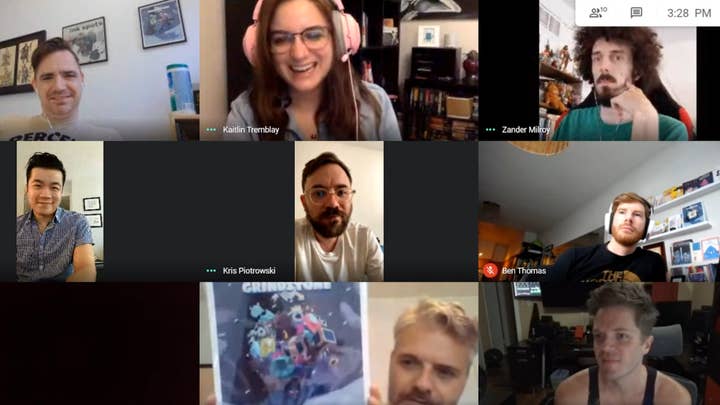
Appoint a Communications Guide

Capy Games is a Canadian developer founded in 2003, and employing around 30 people. It's currently enjoying success with mobile hit Grindstone. Joel Burgess is studio director
One thing that's been interesting with Slack is that someone has to be on top of policing the noise pollution and disorganization that can happen.
We were using Slack before the pandemic, but once lockdown began, it exploded, and we needed to get on top of that. The bellwether for us, ironically, was when we realized that the subject of Covid was coming up everywhere in Slack because of course, it was the biggest thing happening in the world. But it was getting in the way and not everyone wants to be constantly reminded that this existentially dreadful thing is going on.
So we said, look, if you want to talk about this, let's just make a Covid room and that's where you can go and have that conversation. Or, that's where you can avoid going if you're tired of hearing about it and just want to get your head down.
That kicked off a process of compartmentalization in which we went from 20 Slack channels to more than 80 almost overnight. That sounds overly complicated, but it's just a way of organizing subjects and groups of people so they know where to go and have useful conversations, without anyone else being unnecessarily overloaded with information. It helps if someone has oversight over Slack or whichever communications tool you're using. I say 'police' but maybe more of a guide.
Reorient your leadership style
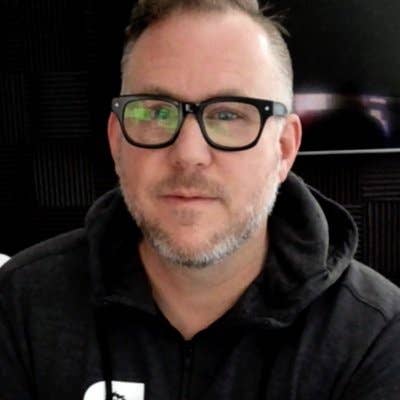
Matt Casamassina is CEO of Rogue Games, a California-based publisher which employs around 20 people
When we began working from home, some employees weren't as communicative as I felt they needed to be. I felt they weren't using tools like Slack enough.
Normally my go-to is to just walk over to [an employee] and say 'hey, we have to deal with this or that'. But it's so much harder when you're at home, sending an email or a Slack out into the digital ether. I want a response right away. But sometimes I might not hear back for hours and I start to wonder, 'hey, where's my response?'.
I learned that's not good behavior from a leader. I'd worked in offices for a long time, and I was programmed for that environment. But those expectations don't fit when you're remote. I really had to address something that came across as me being unreasonable, while making sure that our workflow improved.
So we talked with the team about how to create optimal communication practices, without too much rigidity. We met in the middle. We put practices in place that allowed me to loosen up and unlearn those bad habits that I had to really grow out of. At the same time employees stepped up. We built a system together that everyone understands, and that has really helped our workflow.
Everyone benefits from an ideology of listening to feedback, especially in times of change. A lot of people in leadership positions say they listen but they don't. They pretend to hear but they've already got a conclusion. Deprogramming yourself is hard, right, but it's the way to get results.
Offices still have their place
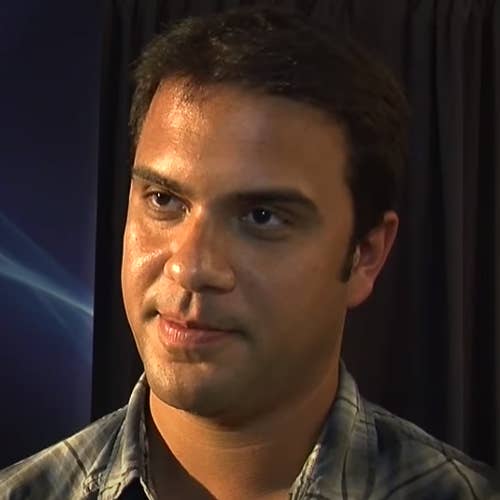
Devolver is a publisher, best known for taking an innovative approach to marketing games like Hotline Miami, Reigns, and the Serious Sam series. Nigel Lowrie is a co-founder and chief marketing officer
We've never had an office, up until now, actually. We have something like 10 people working in London and it felt like a good idea to get an office where they could get together. But it's really just a meeting space.
There are no rigid hours that people have to be there. We trust all our people to get their job done, and how they do that is up to them. Some people like to work their ass off from seven to noon and then take a few hours to go to the gym or do some chores, and then maybe they'll do a few more hours later in the day.
Most of the people in London still work from home, but some of them come into the office for part of the week or more usually, they get together at the office for meetings or just to hang out.
Partly it was Covid that brought us to the decision to finally open an office. The team there are sociable and they like to meet up when they can, even if it's just for a few beers. So it makes sense to provide a place where they can come and work or have meetings with third parties.
It works for us and maybe we'll do it again if we have places where more than a handful of people are working close to one another, and they want an office. But the fact is that the London office is empty a lot of the time, and that's fine.
I think it's more about a company culture than it is about offices or working from home. Anyone who works in a big office knows there are some people who are doing their jobs, and some people who really aren't.
Consider doing something radical

Chicago-based Young Horses gained success with Octodad: Dadliest Catch and last year's Bugsnax. The small developer recently switched to a four-day working week. Kevin Geisler is COO and programmer
The thought of moving to a four-day week came out of having just released a game and dealing with the burnout that coincided. With Covid eating up a lot of big summer plans, taking longer weekends became a focus so we could do short nature trips and reclaim some spare time.
So we said, let's just not work on Fridays.
And since then, we haven't noticed any loss of productivity. I mean, for a lot of people on the team, Fridays were often already kind of a wash. We often used it to have lunches with other local developers, or some would make it a shorter day so they could leave early for errands or doctor appointments. It was sometimes a productive workday, but often not.
So we decided that it could go, and just have Monday through Thursdays as more focused workdays. You might say, well, before you had 40 hours and now you have 32 or whatever, but it never really felt like we were getting eight hours a day in the first place.
Shortening has just given us more focus. Instead of stretching things out on Thursday because we need something to do on Friday, we just make sure it gets done earlier knowing we'll have more time now to recharge.
Security first
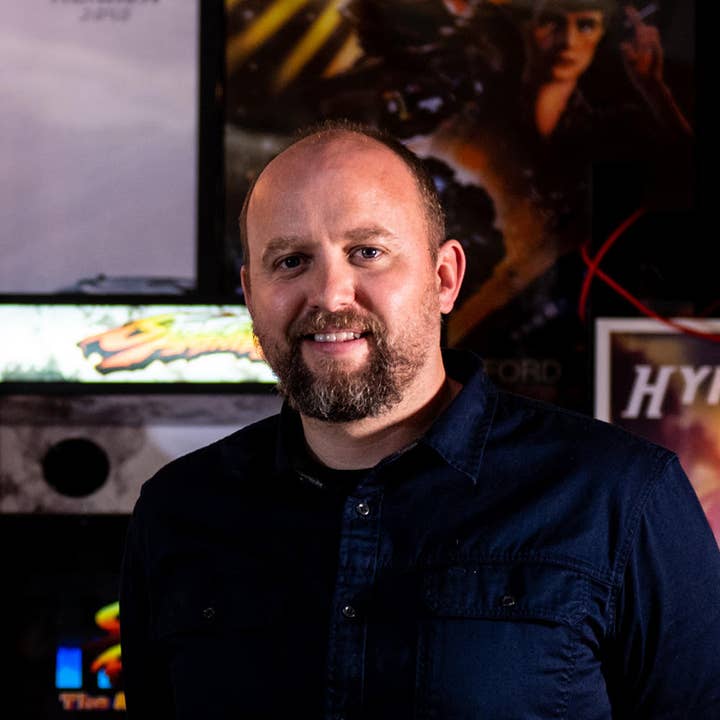
Part owned by Tencent, Milky Tea is based in Liverpool and employs around 26 people. It's best known for Hyperbrawl Tournament, Coffin Dodgers, and Roller Rally. Jon Holmes is founder and studio director
Data and build security are important for everyone, but we've always been very sensitive to it. We've done a lot of contract work, and if we miss a deadline due to a loss of data, we're on the hook financially for any losses incurred by the client.
The reason we went onto the cloud before Covid was down to an issue we had previously. In one of our old studios we had server and it was secure, or so we thought. One day the landlord decided to get some contractors to work on the roof and the workers must have had a few canned drinks on the roof and somehow the cans ended up in the guttering. So, one rainy day without us knowing water started building up on the roof until a waterfall crashed through the roof straight onto our server cabinet, where all our builds were stored.
I was livid. All our code was on that server. Lucky for us, the servers held and the code was okay, but I remember thinking, 'I will never let this happen again'.
So now as well as cloud back-up we have a studio which holds a server. It's smaller than the office we had before, and it's half the cost; because so many of us are working from home. But as well as the server it's a good place to meet up especially for the really creative collaborative stuff which is more fun face-to-face and certainly more productive. I think it's better than making a hard-clean break from having a studio.
Identify the benefits of WFH, and the downsides
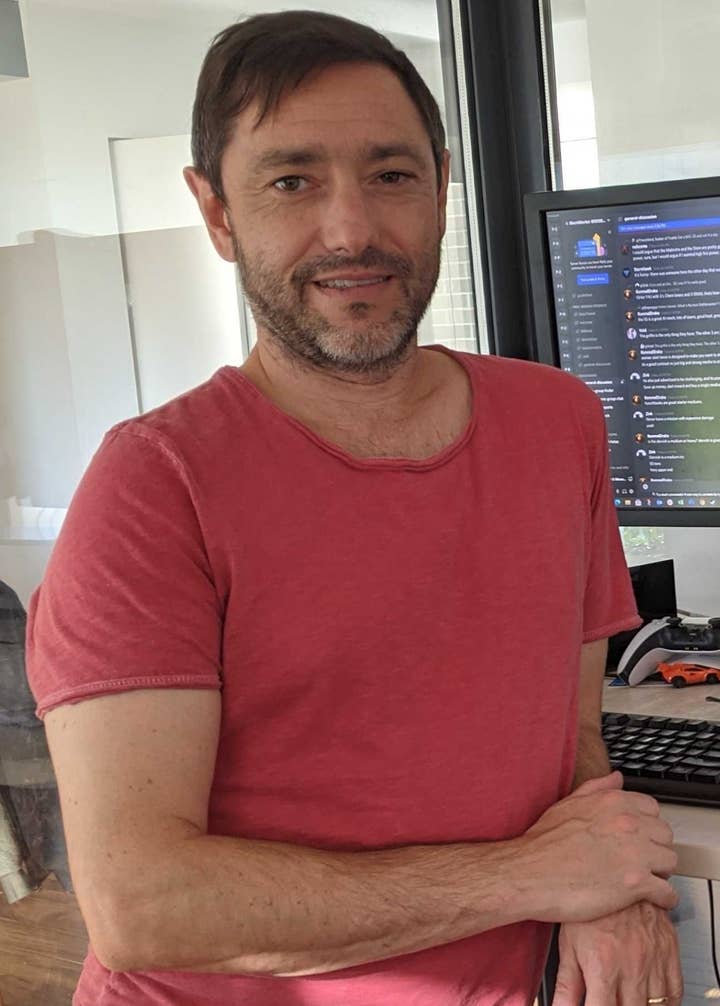
Piranha Games is best known for its work on the Mechwarrior franchise. Based in British Columbia, it employs around 80 people. Kerry Whalen is production manager
We're a technology company so when lockdown happened, everyone had good equipment at home already, so we set up remote desktop and VPN protocols and we didn't feel there had to be that much of a problem.
But one of the first things we saw was a big drop in productivity. I'd say that we took a 20% productivity hit almost right away, and it took a while to come back
We have two different methodologies that we use and they both correlated very closely. The first one is our normal project management tracking -- we call them story points -- and they're a standard measurement for how long a task is likely to take. So a small task might take two days, but a tougher job might take two weeks and they're allocated points. The other system is just the number of new submissions that are uploaded.
Both those go up and down all the time and there are always anomalies for whatever reason, but when the pandemic hit, it was all down.
A lot of it was because of the limitations of remote desktop, and the amount of time that's being wasted uploading and downloading data. If you're using Unreal on a laptop on your kitchen table, your productivity is going to be less than on your PC in the office. If you're an artist uploading a new level on a local network it takes a reasonable amount of time. But on a home network on a 35 megabit per second connection? So it wasn't an ideal solution.
But we also saw some individual increases in productivity, especially in programming. Some of the programmers live a long drive from the office and they used that spared commute time to just get on with their work, and there were no distractions.
We went to everyone and looked at their set-ups and how they could improve, but the biggest improvement was just everyone incrementally getting better at working from home. The artists figured out the best settings for remote desktop, for example. People were learning all these little tricks and they're just getting better at finding all these little workarounds.
But it's not just about productivity. It's about your life too. Are you happier now that you're working from home? A lot of people really are, and that's what we're taking into account as we move beyond Covid, but it's another thing that needs to be thought through carefully.
Learn to read the Zoom room

Mod.io is an Australian service company that specializes in handling developers' modding tools. It's one US presence is business development head Andy Swanson
If I'm in a sales meeting on Zoom, I feel like some of the stuff that I used to do naturally is much more difficult. Even down to who am I talking to. Who's the Alpha? Who's the influencer? Who's the blocker?
I can see those things fast in a meeting, but on Zoom, it takes more effort to judge the hierarchies and the personalities. I don't ever want to be in a situation where I've misjudged the real decision maker or the personality dynamics.
Real world meetings often have a quick check in, so everyone talks about who they are and what they do, but they often are about confirming what you can see for yourself, based on where people are sitting at the table, or their body language. At the start of a Zoom meeting, that stuff is crucial. If you're not paying attention, you can make a big mistake.
I missed going to the shows like GDC and E3, because you don't get that physical connection. I mean, they're a giant pain in the ass sometimes, but you'll always come away with something you can use, new contacts or new business, and I'm looking forward to those coming back. We're all a bit different on the phone or on Zoom than we are in real life.
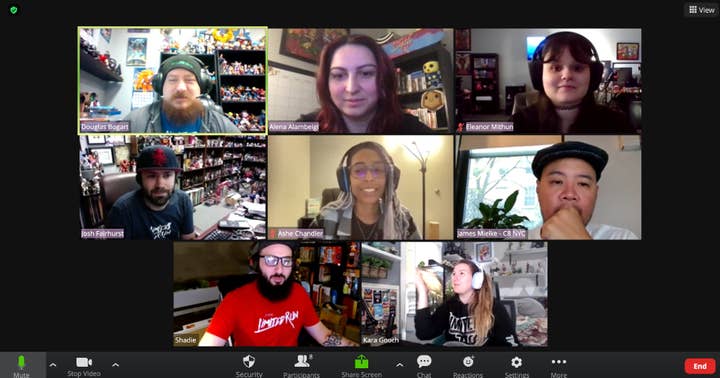
Remote collaboration needs administrators

Limited Run is a physical publisher and distributor, based in Raleigh, North Carolina. Douglas Bogart is COO and co-founder
We were already using stuff like G-Chat, Slack, and Discord as a company so keeping communication flowing wasn't hard. The real struggle was dealing with shipping. We had to close the whole department down to meet the rules our state had, but instead of having our shipping team out of a job, we decided to pay them while they were in limbo. This way they didn't need to stress any further during the pandemic and still pay all their bills.
The other big problem was the delay in shipments for components we needed for our games and vinyl releases. We had to start ordering more stuff in advance and adjusting our timelines to accommodate that. I think things we could have done differently were to have shifted to a solid chat system and production management system. We eventually landed on the right ones but we should have done so before the pandemic.
I think working in the pandemic has shown that Limited Run outside of shipping is very capable of working from home. We are allowing employees to take days to work from home now and we no longer worry that they are not on task as we've seen they can crush their work at home as well as they could at the office.
One of the other things we had to change was hiring more employees in more specialized roles. We now have more people in production roles to keep track of more projects which has really helped keep our pipelines clean. We realized during the pandemic without people being able to collaborate more often in person some projects seemed to get lost in the shuffle.
What lessons did you learn from Working From Home? And what are the biggest challenges for the future? Email us for a potential follow-up story.